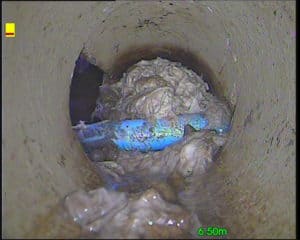Join the UKDN Waterflow (LG) team as we answer some of the most common drain related questions asked every single month on Google.
Q: What does a smelly drain mean?
A: Items that are disposed of down the drain such as food, hair and other substances can get clogged. Bacteria grow on these substances, which can release a foul odour. If your drains are smelling, you may have a blockage or they may need cleaning.
To avoid smelly drains, it’s important to only ever flush the 3Ps (pee, poo and paper) and avoid pouring any FOGs (fat, grease, oils) or food down the drain. You can find out more about the items you should and shouldn’t flush on our blog.
Q: What does a slow draining toilet mean?
A: If your toilet is draining slower than normal, it may mean that you have a blockage. It’s best to get this checked by a plumber or with a CCTV drain survey from UKDN to avoid any further damage that could be costly.
If you have a septic tank, slow draining toilet water could mean that it’s time to get your septic tank emptied.
Q: What do I do if I have a blocked sewer drain?
A: If you have a blocked sewer drain on your property, you could organise a CCTV drain survey to locate and remove the blockage. If the sewer line is not on your property, you will have to notify your local utility company who should be able to come and resolve the blockage.
You can find out more about who is responsible for drains and sewers with our wastewater responsibility guide.
Q: What does pipe lining mean?
A: Pipe lining is a felt tube that is inserted into a broken or damaged pipe – this method is mainly used to keep the process of fixing a pipe less invasive, especially if the pipe is hard to access.
Q: Who is responsible for drains in the road?
A: Typically, it is the utilities company who is responsible for the drains found on the road. For more information on who is responsible for certain drains, read our wastewater responsibility guide.
Q: Why does my sink drain gurgle?
A: If you hear your drain gurgle shortly after using it, it could be a sign that your drains have a blockage or in extreme cases a collapsed or damaged drain pipe. It’s a good idea to get your drains checked if you can hear a gurgle sound persistently.
Q: Can rats climb up drain pipes?
A: Yes, rats can in fact climb up drain pipes. Rats and mice are incredibly good climbers and can even climb vertical walls if they’re rough enough. Rats are also good swimmers and have been known to enter houses through the water-traps of a water bowl. For more information on rats and how to avoid them getting into your home, read our rats: fact vs fiction blog post.
Q: How to stop rats climbing drain pipes?
A: The best way to avoid rats climbing up your drainpipes is to limit access to a food source around your home. Actions like keeping litter and food waste contained and stowed away, along with limiting or moving sources of food – like bird feeders – away from your property can help avoid attracting rodents.
Q: Can I pour cooking oil down the drain?
A: No, pouring oil, fats and greases (FOGs) down the drain or dishwasher can lead to large blockages or even fatbergs within sewers near you. When FOGs are poured down the drain they begin to harden as its temperature falls, trapping any other items flushed down the toilet to form a congealed mass. For more information on Fatbergs, read our independent research on the UK’s flushing habits found on our blog.
Q: How to get roots out of drain pipe?
A: Tree roots are often attracted to either cracked or leaking pipes due to the ideal environment and conditions it create for them – moisture and darkness. There are a number of methods to get rid of tree roots within drains, such as water jetting, mechanical cutting, robotic cutting and excavation –all should be carried by qualified workers.
For more information on how to get rid of tree roots in your drains or if you have any questions about your drains – contact one our UKDN team members today.

